Hairy Hezekiah (3 page)
Authors: Dick King-Smith
“A cow.”
“What's a cow?” asked the camel. “I've never seen animals like you before.”
“We ain't never seen no animals like you before neither,” mooed all the cows. “What on earth are you?”
“I'm a Bactrian camel,” said Hezekiah.
“Come from Bactria, do âee?”
“I suppose so. Like you come from Holstein, I imagine.”
Before they say something nasty about me, he thought, I'd better say something nice about them.
“You're very pretty,” he said. “Can I ask you something?”
“Go on then,” said one of the Holstein cows.
“Well, what are those big things between your back legs? Big things with four other things sticking out?”
“Udders,” they said. “What be them things on your back?”
“Humps,” said the camel. “I store fat in them. What's in your udders?”
“Milk,” they said.
“What for?”
“For people to drink. They milk us.”
People, thought Hezekiah. I don't want them to see me; they'd put me back in the zoo. He decided
he'd ask the cows' advice, politely of course.
he'd ask the cows' advice, politely of course.
“I wonder,” he said, “if you can help me. You see, I've just escaped from the zoo and I don't want to go back there. I want to find somewhere safe to go, somewhere with lots of space. Do you know of anywhere?”
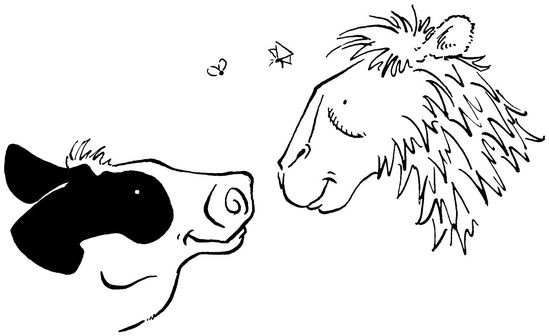
The cows looked at one another. Then they looked again at the large, dark, hairy, humped figure of the camel. Then one cow came closer to
Hezekiah and said, “You're in luck, my friend. There's a place not far from âere where they do keep all kinds of curious critters. That's where you do want to go, I reckon.”
Hezekiah and said, “You're in luck, my friend. There's a place not far from âere where they do keep all kinds of curious critters. That's where you do want to go, I reckon.”
“Oh,” said Hezekiah. “What is this place?”
The cow replied, “âTis the safari park.”
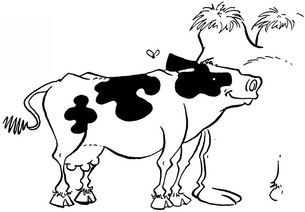
“Safari park?” said Hezekiah. “What does that mean?”
“Well,” said the cow, “we ain't never bin there, of course, but we do hear tell that âtis a fine place to live.”
“Plenty of room for everyone,” said another.
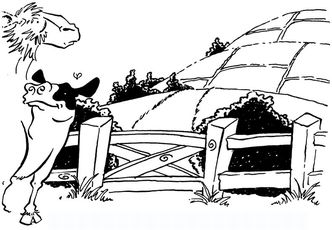
“Bit different from your old zoo, I daresay,” said a third.
“How do I get there?”
The whole herd of Holsteins turned to look in one direction.
“See them hills in the distance?” they said. “With a good few trees on âem?”
“Yes,” replied Hezekiah.
“That's the edge of the safari park.”
“Oh, thanks, thanks!” cried Hezekiah. “I'll go there right away, if you'll all excuse me.”
“But you can't get out of this field,” they all said, “till the farmer opens the gate to get us for morning milking.”
“Oh, I don't need a gate,” said the camel. “I'll go out the same way as I came in. Through the hedge.”
What a day it was for the farmers of that part of Somerset! Since he had left the hills in the darkness, Hezekiah had wreaked a trail of havoc through the countryside. Hedges and fences and gates that kept cows and sheep and horses in were no match for the size and strength of the camel. He simply smashed his way through them.
Worse, it was a Sunday, and though farmers work a seven-day week, fifty-two weeks of the
year, they do expect to take things a bit easier on Sundays.
year, they do expect to take things a bit easier on Sundays.
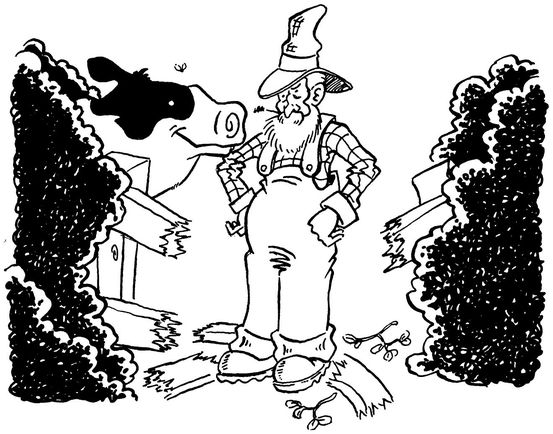
But after Hezekiah burst out again through the far hedge of the Holsteins' field, there was chaos in his wake all through that part of the West Country. Everywhere livestock had taken
advantage of the camel's bulldozing passage. Dairy cows, beef cattle, sheep, horses, and poniesâall found themselves free to leave their pastures and paddocks and go wherever they pleased.
advantage of the camel's bulldozing passage. Dairy cows, beef cattle, sheep, horses, and poniesâall found themselves free to leave their pastures and paddocks and go wherever they pleased.
Farmers can curse as well as most people, but never had there been heard such dreadful cursing as on that Sunday morning. Everyone tried to round up their strays and get them back home and mend the broken gates, the smashed fences, the great camel-sized holes in the hedges.
Hezekiah's Holstein friends were a good example of the confusion, for they all went out through the gap that he had made and mingled happily with a neighboring herd of Ayrshire cows in the next field. It took so long for their angry owners to sort them all out that morning milking did not start till the afternoon.
Hezekiah, meanwhile, made steady, destructive
progress toward his goal, crossing, though he did not know it, from Somerset into the county of Wiltshire. He was filled with curiosity about this strange place called a safari park. What would it be like? At
progress toward his goal, crossing, though he did not know it, from Somerset into the county of Wiltshire. He was filled with curiosity about this strange place called a safari park. What would it be like? At
last he broke out into a road, a small country lane bordered by trees. Ahead of him was a junction, at which a signpost stood. SHORTSEAT, it said.
Hezekiah hesitated. “Is that the way to the safari park?” he asked himself, and then he heard in the distance the answer to his question. It was a deep rolling roar that ended in a couple of grunts.
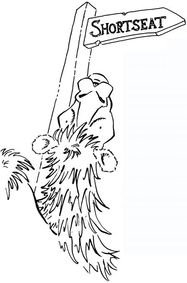
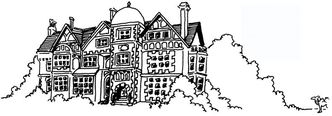
The great country house of Shortseat was the ancestral home of a noble family. The present Earl of Basin had inherited the estate on the death of his father, who had turned his well-wooded lands into a safari park. First he introduced lions. Later he brought in other kinds of interesting and attractive animals that would normally be found behind bars in zoos. But it was the lions of Shortseat that first attracted the public in great numbers.
As well as coming to see the animals, they came to look around the great house, and on that Sunday afternoon it was filled with people. The present Earl of Basin moved easily among them, chatting with the visitors, most of whom felt honored to be addressed by such a great nobleman.
This Lord Basin was (like Hezekiah) an extremely hairy person, and he chose to wear very colorful clothes, as though to mark himself out from the common herd.
On this day he was dressed in sky-blue corduroy trousers, a pink shirt with an emerald-green cravat, and a black velvet jacket lavishly embroidered with gold thread.
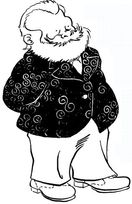
At that moment a servant came up to the Earl. “My
Lord,” he said, “you are wanted on the telephone.”
Lord,” he said, “you are wanted on the telephone.”
“Will you forgive me?” said Lord Basin to the visitors (for politeness costs nothing). “I fear I must leave you.”
“Of course,” murmured some, while many others, unsure of how properly to address the nobleman, replied, “Of course, sir” or “Of course, Your Lordship” or “Of course, Your Grace” and one small boy said, “Yes, Your Majesty.”
The Earl of Basin made his way to his study, where his estate manager was waiting, phone in hand.
“It's the police, sir,” he said.
“Whatever do they want?” asked Lord Basin.
He took the phone.
“Hello?” he said.
“Lord Basin?” said a voice.

“Speaking.”
“Sorry to bother you, my Lord, but we were wondering if any of your animals had escaped? It would be a large one by the look of things.”
“Escaped?” said the Earl. “Animals don't escape from Shortseatâthey're too happy here. What animals have you found?”
“None, my Lord,” replied the policeman, “but we are getting reports of widespread damage in that part of Somerset to the west of you. Everywhere farmers and landowners are reporting broken gates and fences and big holes through hedges, and they suspect that something large and strong may have escaped from Shortseat. There are fears that it might be one of your lions.”
Â
“Rubbish!” said Lord Basin loudly. “Lions don't break gates and make holes in hedges. Sounds more like a camel to me.”
“Very good, my Lord,” said the policeman, and hung up.
Many years ago, when Lord Basin was a boy, his father had taken him on a visit to the very city zoo from which Hezekiah had escaped, and he had ridden on a Bactrian camel.
He'd never forgotten the sensation of sitting between those two great humps as the camel swayed along the paths of the zoo.
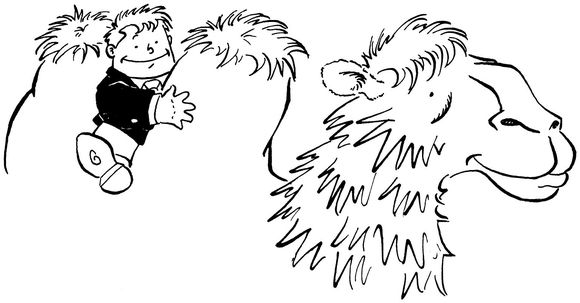
When he was a young man, he heard that that camel had died of old age. When later he inherited Shortseat, he vowed that he would one day have a camel there. But they were very rare. Only a thousand or so still survived in Mongolia's Gobi Desert.
“You haven't had any report of anything escaping, have you, John?” said Lord Basin to his manager.
“No, sir.”
“Well, whatever's caused all this damage, it's got nothing to do with me.”
Even as Lord Basin spoke, Hezekiah was approaching the main gate of the Shortseat Safari Park.
Lord Basin sat back in his office chair, stroking his beard thoughtfully Maybe the feel of it made him think of hairy creatures.
“Switch on the television, John, please. I want to watch the West Country News.”
How I'd love to have a Bactrian camel, he thought, and to his utter amazement the first item on the news was about the escape of a camel from the zoo. It had set off cross-country, the newscaster said, ending up at Shortseat.
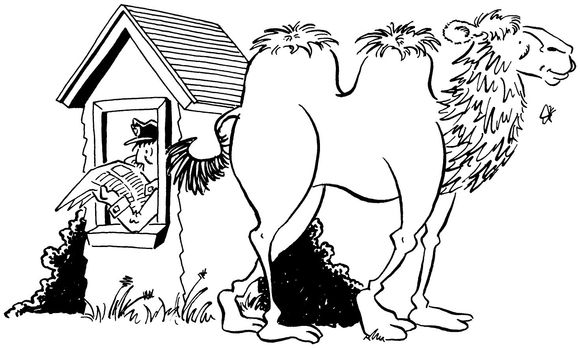
Maybe there is a special deity that looks after earls, but at that very moment Hezekiah passed through the gates into Shortseat before the astonished eyes of the gatekeeper and a number of visitors who were about to enter.
With slow steps (for he was now somewhat hoofsore) he made his rolling, dignified way, his humps swaying a little, down the long, straight avenue that led to the great house.
Frantically, the gatekeeper telephoned the manager.
Hastily, the manager told the Earl.
Excitedly, the Earl made his way through the visitors to the front doors of Shortseat and stood, in his colorful raiment, at the top of the stone steps that led up to the entrance. Behind him, faces peered from every window, witnesses to the arrival of Hezekiah at Shortseat.
They saw the great hairy Lord standing at the
top of the steps. They saw the great hairy camel at the bottom.
top of the steps. They saw the great hairy camel at the bottom.
Hezekiah was very tired now, for he had traveled a long, long way, and he had no intention of trying to climb those steps. Like all camels, he had horny kneepads to rest upon.
So, to the delight of all and in particular of the owner of Shortseat, Hezekiah the Bactrian camel knelt before the Earl of Basin.
Other books
El Círculo Platónico by Mariano Gambín
Touch of the Fire God [Scions of the Ankh 1] (Siren Publishing Classic) by Toni L. Meilleur
The Journey Prize Stories 22 by Various
Song of Scarabaeus by Sara Creasy
Strongheart by Don Bendell
Make Me Whole by Marguerite Labbe
No Name in the Street (Vintage International) by Baldwin, James
Love & Loss by C. J. Fallowfield
The Notebook by Nicholas Sparks
To the End of the War by James Jones